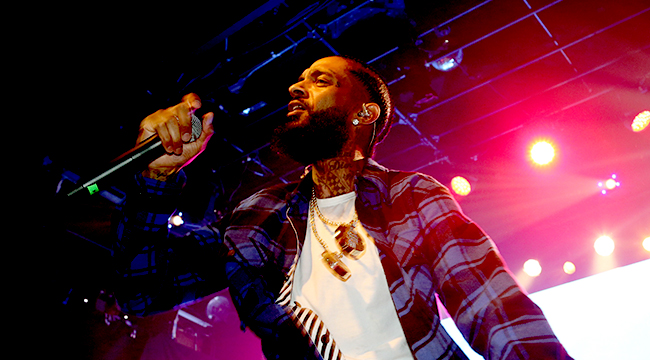
It’s still hard to get used to the idea of Nipsey Hussle as a relative rookie in the music business, but he technically is. A perennial outsider for the first decade of his rap career, his “debut” album under Atlantic Records, Victory Lap, would technically be his 14th release — if you’re counting groundbreaking mixtapes like Crenshaw and Mailbox Money, which he retailed for $100 and $1000, respectively. Yet, in the eyes of much of the music industry, Victory Lap is the first of his albums that “counts,” which makes its Grammy nomination for Best Rap Album even more of an achievement — almost as much as it is an acknowledgement of Nipsey’s ten previous years innovating and grinding it out independently of the major label system.
Not that he needed it, but the nomination is a validating gesture from the Grammy committee, which is made up of Nipsey’s industry peers and other music business professionals who have likely been aware of his game-changing gambles for a while. Don’t misunderstand; Victory Lap is good enough on its own to deserve the award, but the nod it has received plays a dual purpose. On one hand, the nomination shows that the Grammy committee is increasingly aware of alternative options in hip-hop outside of the usual, default Eminem nominations that seemed to be standard practice for most of Nipsey’s grind to this level.
On the other, it also recognizes the pioneering that Nipsey has done to date, since debut albums rarely seem to rate nominations, let alone wins. While it’s not quite the trailblazing 2017 nomination of Chance The Rapper’s Coloring Book (which helped legitimize streaming as the de facto default music delivery format), it is another step toward acknowledging the ways in which hip-hop pushes boundaries and upends conventions in the music world such as blurring the lines between promotional mixtapes and studio albums. Nipsey especially contributed to this paradigm shift with the unorthodox, laissez-faire approach he took to releasing music prior to signing on with Atlantic.
For the Grammys to acknowledge that industry redefining push opens the door for the award show to start recognizing other, even less conventional artists and albums in the future. Since we know at least some of the selection committee seem aware of the vibrant underground culture of mixtapes and truly indie artists, future Best Rap Album fields could be open to some of the truly inventive stuff that doesn’t fit the major label mold like the so-called “Soundcloud rap” movement or the jazz rap explosion coming out of Chicago by way of rappers like Joey Purp, Mick Jenkins, Noname, and Saba.
It could mean future nominations for up-and-coming artists like the wildly creative Tierra Whack and Leikeli47, who challenge conventions for presentation of women in hip-hop and the process of putting together an album in the first place. It could lead to future selection committees digging deeper each year to find the true standouts and gems and iconoclasts who are willing to try crazy ideas like selling $100 mixtapes and forego major label splits in favor of maintaining artistic control of their voices.
It could also bring renewed attention to the artists featured on Victory Lap, expanding the range of voices the Grammys promote beyond just the artsy, cerebral picks of the past like Chance, Eminem, Kanye West, and Kendrick Lamar (who is also featured on Victory Lap on the song “Dedication”). Imagine more raw voices like YG and Buddy receiving the same kind of attention for their blunt, street-certified observational rap. A stronger variety of styles and sounds expands the possibilities for the genre as a whole, encouraging even more freedom of expression from an artist base who often only ever has rap as a creative outlet.
That was, after all, Nipsey’s story. Rap allowed him to leave behind the dangerous lifestyle of gangbanging and drug dealing to open up businesses that revitalized his neighborhood and provided even more opportunities to his neighbors and the youth who look up to him. Every innovation that he added to hip-hop’s tapestry was in part a gamble aimed at improving his life and the lives of others through his art. His nomination is inspirational for anyone who felt like their ideas were too crazy or experimental, and aspirational for anyone following in his footsteps. Because of Nipsey Hussle, the next young genius carrying a world-changing idea in their mind and their heart might not have to wait ten years to finally take their own victory lap. Nipsey’s Grammy nomination has opened the door to make that potential a reality.






